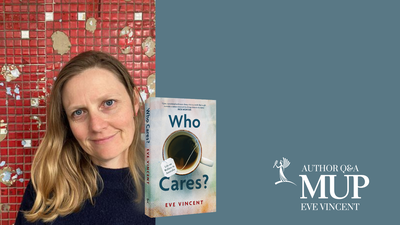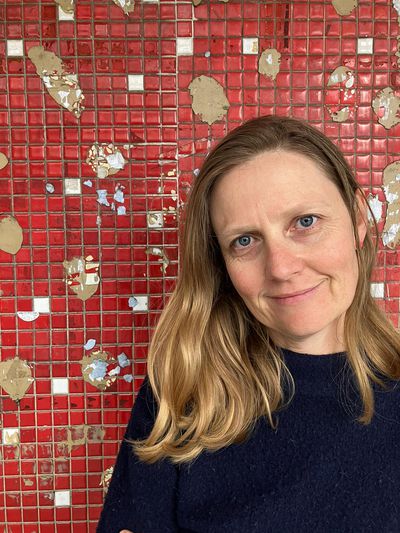Q & A with Eve Vincent—Author of Who Cares? Life on Welfare in Australia

1. What prompted you to write about Australia’s welfare state?
Even before the pandemic, I was becoming increasingly aware of and concerned about growing inequality in Australia. I wanted to understand what it was like to face poverty, to need assistance, and how today’s welfare system treats those most in need. The first phase of the pandemic represented a reprieve for those receiving social security, because of temporary increases to the JobSeeker Payment but also, and importantly, because of the suspension of the conditions attached to the receipt of a range of payments. That moment has passed, and inequality is intensifying again.
It was also important to me to move beyond the idea that being in receipt of social security defined people. In the book I talk about ‘denaturalising the category of welfare recipient’. By that I mean that I talked to people about their whole lives as well as their experiences of and analysis of the welfare system. Interviews ranged over people’s histories, dreams, fears, and passions. That’s partly where the theme of care emerges. Many of my interviewees are busy doing a kind of ongoing, necessary work that is not recognised as work. They look after babies, kids, sick relatives, each other. The welfare state, by contrast, doesn’t look after them: it is uncaring.
2. How does Australia’s welfare system treat people relying on its benefits?
My interviewees taught me that the welfare system treats those in need of assistance with suspicion and disdain. In more formal terms, the Australian welfare state can be understood as ‘conditional’ and ‘punitive’, which reflects a global shift across comparative welfare states. This shift has been underway since the 1990s in Australia. In the book I examine its everyday effects by homing in on two specific welfare measures.
One is the controversial cashless debit card, which the Albanese Government abolished soon after its election. The cashless debit card quarantined 80 per cent of people’s social security payments in affected sites, so that this portion could not be spent on alcohol or gambling products.
The other specific welfare measure I examine is ongoing, although a major inquiry is currently underway into this program. It’s called ParentsNext and involves mostly single mums undertaking activities as a condition for receiving Parenting Payment. This program has also been controversial, especially because of the high rates of payment ‘suspensions’ incurred when participants are deemed not to have fulfilled their participation requirements. ‘Suspension’ is a technical term: in reality, it means no income coming in all of a sudden, no groceries, paying a bill late, and the stress and time involved in navigating the system to get one’s payment reinstated. And the very idea that single parents need to sign a ‘participation’ plan gives the reader idea of how much this program devalues the work of parenting – as if raising children isn’t participating!
3. What changes need to be implemented to Australia’s current welfare system, to benefit people relying on its services?
Who Cares? is very much a documentary exercise. It’s about people’s voices, stories, experiences. It tries to evoke life on welfare as it is lived, in all life’s richness and messiness. What remains an open question, I think, is whether my book is about the Australian welfare state right here, right now, with the Albanese Government offering only some minor and inconsequential tweaks to its design. That’s the rather pessimistic conclusion I come to. But I would love to be wrong! Perhaps my book documents the Australian welfare state at its most cruel, and we’ve entered a new era, with more fundamental change afoot?
While policy proposals are not my focus, obviously the miserable JobSeeker Payment needs urgently to be lifted: it currently sits at around $48 a day for a single person. It looks likely that the May budget will include a rate rise, but it’s not clear what that raise will look like: with housing, energy and food costs so high this is a critical issue to watch. The whole system of mutual obligations, which is the name given to the principle of conditional welfare, serves only to punish those most vulnerable, making difficult lives harder. Readers with an eye to what happens next should follow the important work of the AntiPoverty Centre and also the Australian Basic Income Lab.
4. Who Cares? shares experiences of people relying on Australia’s welfare system. Which story did you find the most compelling?
There’s no one story that has stuck with me more than others. I talked to a really diverse collection of people about such a complex mix of things. My interviewees’ largely negative experiences of employment services providers definitely became another major theme: my interviewees encountered some staff who were patronising, some who were well-meaning, personable and supportive, some who were disorganised, and some who verged on hostility. I also talked to people about their love of painting; the acute shame associated with handing over the cashless debit card in the local bakery; the ways in which others redirected or refused shame; foster caring as a vocation; the financial support extremely stretched people provided to others, even as their own funds ran dry; what it takes to maintain a welcoming household on a straitened budget …
It was a real honour to have these conversations.

